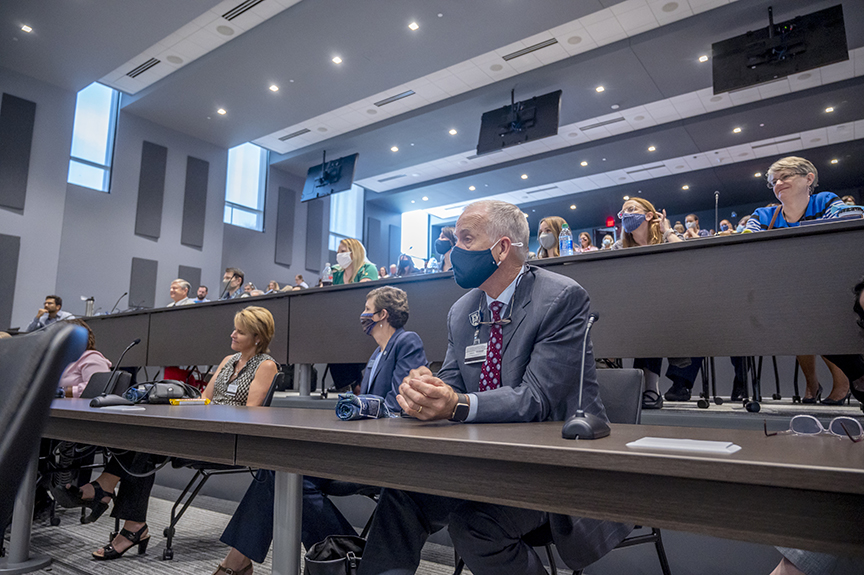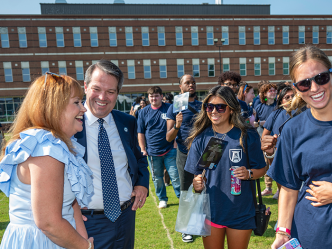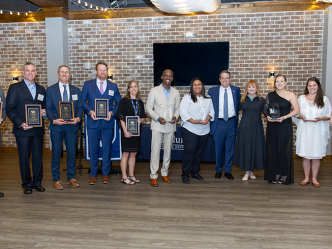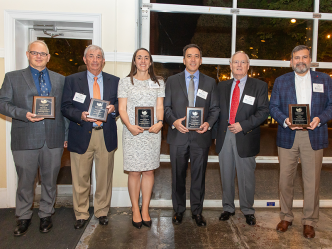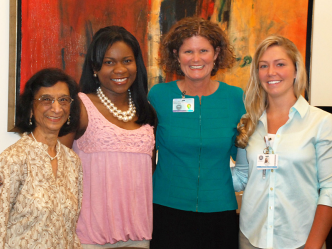Two priorities within Augusta University’s new strategic plan, Creating a Legacy Like No Other, include “learning” and “student success.” With those in mind, close to 300 of Augusta University’s faculty are going back to school this summer through a faculty instructional development series.
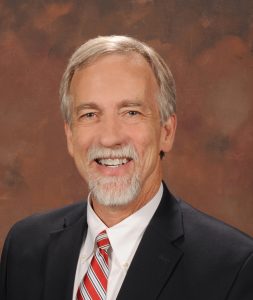
“This investment shows an institutional commitment from our leadership to the notion that Augusta University is committed to quality instruction,” said Dr. Zach Kelehear, vice provost for instruction at Augusta University.
“This summer, we’re trying to focus on engagement from both a student’s perspective and engagement from the faculty’s perspective because there’s a bidirectional responsibility for learning in the classroom. It’s not all on the faculty and it’s not all on the students — there has to be true bidirectional engagement, and it’s in that spirit that we are encouraging our faculty by providing opportunities for them to reflect on their own teaching styles and make some adjustments. This is the third summer we’ve done this instructional development and it’s all focused on supporting faculty instruction.”
The summer development series, entering its third year, is put on by AU’s Center for Instructional Innovation, spearheaded by Stacy Kluge, instructional design manager, and Arthur Takahashi, instructional designer.
In 2020, the COVID-19 pandemic created a need for training in remote teaching, and Kluge, Takahashi and others acted quickly to create an emergency remote teaching series.
“In the first year, we scrambled to create training that would enable faculty to teach in hybrid and online modalities in response to the pandemic.” Kluge said.
“Then in year two, we tried to do three things. First, we wanted to take the training we did in year one, hone it and make it better. We then wanted to create more advanced options for faculty who had really gotten into technology. And then finally, we knew that some faculty were really hungry for community and connection because they had been home for a long time, so we offered a session that wasn’t at all about technology. It was about humanizing instruction and the human element. It was peer-based and discussion-led on different topics by different peer experts.
“That went so well that we continue to do faculty learning communities throughout the year on similar topics, and we expanded that during this summer’s session.”
The summer of 2021 saw the development series move to a hybrid model for the continued safety and comfort of as many as possible, and again, about 200 faculty took advantage of the series.
In 2022, three options are being offered — in a hybrid model — and close to 300 faculty have already signed up with the mission of making AU’s classrooms more engaging and better suited for today’s students.
“We know from recent research in neuroscience that there’s no learning without emotion,” Takahashi said.
“Emotion is embedded throughout the learning process. It feeds the motivation to learn. One of the researchers that we’ve been reading says that people only think about things that they care about, and they cannot learn if they are not thinking about those things.
“If students come to class and they’re not emotionally invested, then they aren’t prepared. Learning is just not going to happen. So how can professors create this safe, engaging environment in the classroom? We hope that through these development series that we can help our faculty do just that.”
Faculty Learning Communities
One of the three cohorts offered for the 2022 faculty development series is Faculty Learning Communities. Faculty in this option, which is capped at 121 participants, have enrolled in up to two short courses on teaching and learning topics that will last from the beginning of May through the middle of November. These asynchronous short courses, offered by the University System of Georgia, will serve as the curriculum for learning communities of the same name. Faculty will meet with their learning communities four times as they complete their coursework.
Short course topics include: Growth Mindset for Faculty, Small Teaching — Retrieval Practice, Elements of High-Impact Practices, Scholarship of Teaching & Learning and Transparency in Learning & Teaching.
“This is the fourth time I have served as a facilitator, and I enjoy facilitating Faculty Learning Communities because it gives me a chance to meet faculty across all of Augusta University and share ideas and strategies for enhancing our educational practices with them,” said Dr. Laura Rychly, program director for the Education Specialist in Advanced Educational Studies program and associate professor within the College of Education at Augusta University.
“Our collective knowledge of how learning occurs, from diverse sources such as a neuroscientific perspective and a cultural perspective, keeps growing and changing. It is my favorite thing to study ways to help information make sense to others.
“As a faculty member in the College of Education, being able to talk with faculty in other fields about learning is a great source of joy for me. I think when faculty are committed to reflecting about their teaching practices and taking on new, creative ways to communicate the content knowledge and skills they are passionate about, then deep and transformative learning is possible for our students.”
AU Online Teaching Certificate
Another cohort is aimed at acquiring microcredentials. This option — which was capped at the first 110 participants and began in early May — focuses on online and hybrid course design and facilitation skills. This independent, self-paced offering is delivered asynchronously. Upon completion of all 13 microcredentials, faculty are awarded the AU Online Teaching Certificate.
Among others, course topics include: Accessibility and Usability, Creating a Course Overview Module, Learning Objectives, Assessment Strategies, Engagement, Instructional Materials, Multimedia Learning, Online Course Facilitation and Online Synchronous Teaching.
“The microcredential course designed this training to help faculty better design, develop and teach hybrid and online courses, but it teaches best practice design and delivery for all courses. Our department is currently undergoing curricular revision, and this is a great way to get everyone on the same page regarding course development and delivery best practice,” said Dr. Colleen Hergott, chair of the Department of Physical Therapy within the College of Allied Health Sciences at Augusta University.
“It is so important for all faculty to be challenged to improve teaching practices and course design. These courses provide a summary best practice and practical tools for implementation, and the learning assignments are applied to our current courses so we can implement changes while learning. In addition, learning new methods for instruction get the faculty excited about teaching, and that transfers to students excited about learning,” Hergott said.
“The administration has demonstrated that they value our faculty and the quality of teaching practices enough to pay for the additional training outside the workday. It makes me feel valued as an employee that the administration understands the time demands and is willing to compensate faculty. It also makes me proud that our university values quality of delivery and design enough to pay for it.”
Invited Scholar Series
The Invited Scholar Series — this year with the theme of “Fostering Student Autonomy, Connection, and Competency” — focuses on student motivation and its ties to metacognitive strategy use and successful course performance. This cohort was capped to the first 60 participants. In this course, participants will explore effective pedagogical techniques that emphasize the psychological aspects of learning.
This offering has an asynchronous component in D2L, Augusta University’s online learning software, as well as required synchronous meetings in Microsoft Teams. Dr. Jody Langdon, a self-determination theory scholar and professor of exercise science and coaching at Georgia Southern, will facilitate this offering.
The series is divided into four weeks. Week 1’s topic is “Faculty & Student Mindset,” Week 2 is “Intrinsic Interest, Purpose, Autonomy,” Week 3 is “Fostering a Sense of Belonging (relatedness)” and Week 4 is “Building Competence in Learners.”
“I have been in the Summer Faculty Development cohort for three years, and I have enjoyed each class, used the information and applied it to my courses,” said Diane Robillard, associate professor in the Department of Biobehavioral Nursing in the College of Nursing at Augusta University.
“I have enjoyed meeting faculty from other parts of campus and hearing about their teaching and all the amazing things they are doing on campus. Learning from other faculty is probably one of the best parts of faculty development. For example, I teach nursing and last summer I was paired with faculty from anatomy. When they shared what they were doing to teach the material, I leveraged that strength and applied it to a physical exam course and it worked great.”
 Augusta University
Augusta University
